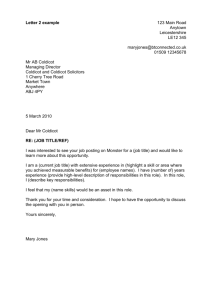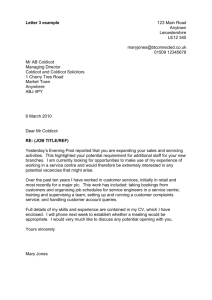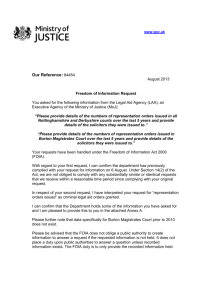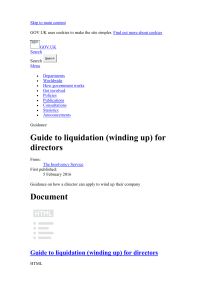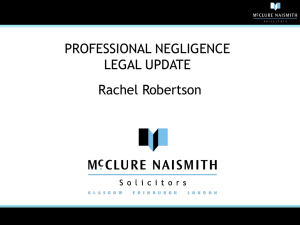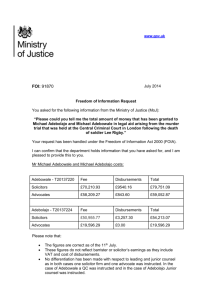Commercial Law Practice: An Expert Guide
advertisement
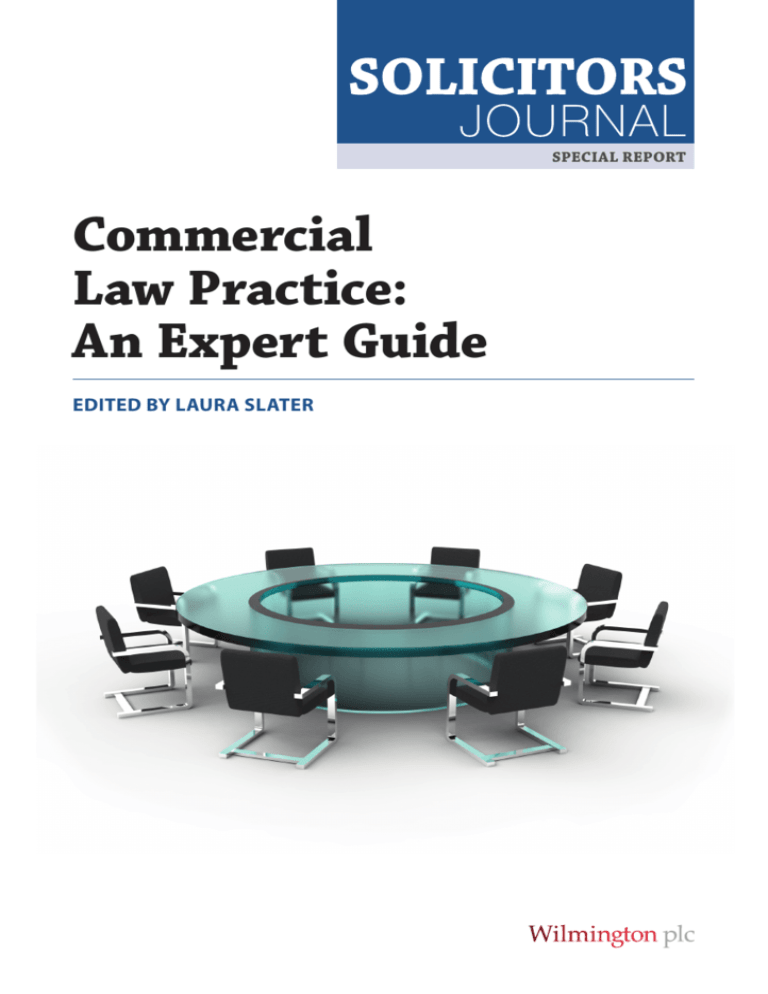
SPECIAL REPORT Commercial Law Practice: An Expert Guide EDITED BY LAURA SLATER Commercial Law Practice: An Expert Guide is published by Ark Group in association with Solicitors Journal UK OFFICE 6-14 Underwood Street London N1 7JQ United Kingdom Tel +44 (0)20 7566 5792 Fax +44 (0)20 7324 2373 publishing@ark-group.com www.solicitorsjournal.com ISBN: 978-1-78358-195-5 (hard copy) 978-1-78358-196-2 (PDF) Head of Publishing & Research Fiona Tucker fiona.tucker@wilmington.co.uk Reports Content Manager Helen Roche helen.roche@wilmington.co.uk Assistant Editor Laura Slater laura.slater@ark-group.com UK/Europe/Asia enquiries Ken Fitzgerald ken.fitzgerald@ark-group.com Copyright The copyright of all material appearing within this publication is reserved by the authors and Solicitors Journal. It may not be reproduced, duplicated or copied by any means without the prior written consent of the publisher. SJ0007 Commercial Law Practice: An Expert Guide EDITED BY LAURA SLATER Contents Executive summary .................................................................................. VII About the authors .................................................................................... XI Trust and transparency .............................................................................. 1 By Debbie King, partner at Farleys Solicitors LLP Information on beneficial ownership ................................................... 2 Bearer shares ................................................................................ 3 Corporate directors ......................................................................... 4 Filing requirements .......................................................................... 4 Changes to the directors’ disqualification regime .................................. 5 Conclusion .................................................................................... 5 Top tips about insolvency for the commercial lawyer.................................... 7 By Stephen Allinson, consultant and licensed insolvency practitioner at Lester Aldridge, Solicitors The present state of the market ......................................................... 7 The test of insolvency ...................................................................... 8 Administrations and pre-packs ........................................................... 9 A new look statement of insolvency practice (SIP) 16 .......................... 10 Fee issues ....................................................................................11 More reform .................................................................................11 III Contents Has data protection just gotten trickier? .................................................... 17 Dr C. N. M. Pounder, director at Amberhawk Training Limited What is a regulation? ....................................................................17 Transparency and consent is more important ......................................18 Marketing with consent ..................................................................19 Security, data processors, and data loss ............................................19 Overseas transfers ........................................................................ 20 Codes of conduct .........................................................................21 Fines and penalties ........................................................................21 Documentation and notification ....................................................... 22 Conclusion: A three-step action plan ................................................ 22 A practical guide to adjudication ............................................................. 23 By Darryl Royce, barrister at Atkin Chambers in Gray’s Inn What is adjudication? ................................................................... 23 The contracts affected by statutory adjudication ................................. 24 Purpose of the statutory adjudication process ..................................... 24 The procedure ............................................................................. 25 Challenges and participation in the adjudication ................................ 25 Getting your tackle in order – A checklist .......................................... 26 Conduct of the adjudication ........................................................... 27 Enforcement ............................................................................... 27 General advice............................................................................ 28 A step-by-step guide to due diligence ....................................................... 29 By Harry Dronfield, associate solicitor at Rollingsons Solicitors Ltd Buyer beware .............................................................................. 29 Stages of due diligence ................................................................ 30 Summary .................................................................................... 33 Outsourcing contracts: An examination of the more challenging issues ........ 35 By Sam De Silva, partner – head of IT & Outsourcing at Penningtons Manches Introduction to step-in .................................................................... 35 When are step-in rights appropriate? ............................................... 35 When should the customer be entitled to step in? ............................... 36 What should happen at the end of a step-in period? .......................... 37 IV Commercial Law Practice: An Expert Guide How can the effect of step-in rights be minimised for the service provider? .................................................................................... 37 Customer’s argument for step-in rights and the typical service provider response ..................................................................................... 38 The pragmatic approach ................................................................41 Introduction to benchmarking .......................................................... 42 Cost structure ............................................................................... 43 Revisiting service levels/service delivery ............................................ 43 Comparing ‘apples to apples’ ....................................................... 44 Behaviour of the service provider .................................................... 45 Representative sample ................................................................... 46 Frequency of benchmarks .............................................................. 46 Timing of first benchmark ............................................................... 46 Involvement of the benchmarker? ..................................................... 47 Benchmarking report .................................................................... 47 Who bears the cost of changes in law? ........................................... 48 The customer’s interests .................................................................. 49 Service provider’s interests .............................................................. 50 Mutual interests ............................................................................ 50 Three kinds of laws ....................................................................... 50 The ‘How’, ‘When’, and ‘Why’ of compliance ................................... 51 Common concerns of the customer .................................................. 52 Summary .................................................................................... 53 Drafting trans-Atlantic IP agreements: Legal differences to watch out for .... 55 By Lorna Brazell, partner at Osborne Clarke Patents ...................................................................................... 55 Trade secrets .............................................................................. 56 Copyright .................................................................................. 57 Trademarks ................................................................................ 59 Conclusions ................................................................................ 60 Sentences without meaning: How to interpret commercial contracts – How to draft clearly ................................................................................ 61 By Mark Lucas, partner at Barlow Robbins LLP How do you interpret a commercial contract? .....................................61 V Contents A shift in approach, from literal to commercial ....................................61 Ambiguous provisions? .................................................................. 63 Chartbrook ................................................................................ 63 Other examples of ambiguous wording ............................................ 66 Rainy Sky v Kookmin ..................................................................... 68 Interpretation of commercial contracts in summary ............................... 69 Practical lessons for draftsmen of contracts ........................................ 69 Conclusion .................................................................................. 77 For clearer contracts, choose ‘active drafting’ over ‘passive drafting’ ........... 79 Kenneth A. Adams, consultant, writer, and speaker on contract drafting Uncritical copying ........................................................................ 79 Dysfunctional language ................................................................. 79 Elements of passive drafting ............................................................81 Elements of active drafting ............................................................. 83 Effecting change .......................................................................... 85 Marketing and business development strategies for commercial lawyers...... 89 By Douglas McPherson, director of Size 10½ Boots Defining your service offering ......................................................... 89 Packaging your ‘product’ ................................................................91 Targeting your market .....................................................................91 Project management – The business approach to running matters ............... 95 By Martin Richardson, principal consultant at MJR Consulting The project and the client .............................................................. 96 The project team .......................................................................... 97 Project tools and techniques ........................................................... 98 And finally .................................................................................. 99 VI Executive summary COMMERCIAL LAW is an intrinsic part of the day-to-day business landscape. Solicitors who focus on commercial and contract law – from small through to City firms – are responsible for guiding business leaders and managing commercial deals, and as such they have a huge impact on the business world. It is therefore essential that practitioners keep up to date with the latest regulatory and legislative updates, as well as with the issues and practices that can affect their clients and firm. Commercial Law Practice: An Expert Guide provides detailed guidance and updates for practitioners focusing on commercial and contract law in an easy-to-read guide, broken into individual articles from a range of expert practitioners and consultants. The guide is designed to aid solicitors in their day-to-day practice, from drafting contracts and advising clients through to important activities for the firm or practice group such as marketing and project management. As part of its coverage of recent legislative updates, this guide contains advice on the Small Business, Enterprise and Employment Act 2015 (SBEE), which has introduced some of the most significant changes to UK business law in recent times. The first article discusses the changes UK businesses must prepare for as the Act is implemented in stages over the course of 2015/2016, with the aim of helping solicitors when advising on this development. Following on from this, the second contributor provides more detail on the implications of the SBEE for insolvency practitioners (IPs) in particular, as one of several significant changes in this area. The author also offers guidance to IPs in light the Deregulation Act 2015, as well as the on-going pre-packaged administration debate, and looks ahead to the upcoming revision of the Insolvency Rules (proposed for 2016), which will have significant implications for the work of commercial lawyers in general. Another development which commercial lawyers and businesses operating in the EU will be watching with interest is the progress of the proposed VII Executive summary EU Data Protection Regulation which, among other things, will increase standardisation of data protection rights and rules across member states. The next article in this guide discusses this topical issue, outlining the likely changes to the data protection regime, and suggests practical steps businesses can take to start preparing, which solicitors should be able to advise on. Several articles in this report offer best practice guidance on some traditionally tricky areas of commercial law. Statutory adjudication, for example, has become increasingly complex since it was introduced in 1998. Accordingly, practical guidance is provided here on adjudication procedure to help those advising to identify potential grounds for challenge, and to ensure a positive outcome for their clients. With mergers and acquisitions activity on the increase in the UK, another article provides a masterclass on due diligence procedure for solicitors acting on behalf of the buyer or seller, including the key steps that must be taken to ensure that the requisite information is elicited or declared. Another tricky area – and growing source of work – for commercial lawyers is outsourcing. While strategic outsourcing can bring obvious benefits to businesses in terms of cut costs and heightened efficiency, there are also a number of common pitfalls that must be anticipated and avoided – and this is not always as straightforward as it seems. Considering the outsourcing agreement from the point of view of both the customer and the service provider, one contributor suggests best practice for lawyers advising either side. Following on from this, another article looks at the subtle differences in detail and the implementation of intellectual property laws across various jurisdictions, which are all the more dangerous because the laws are – on the face of them – increasingly similar. Variations in how terms are used in different jurisdictions (or are understood in different industries) can cause future headaches for lawyers if sufficient care is not taken when drafting a contract. Similarly, not taking the time to spell out (or eradicate) ambiguous terms, or uncritical copying of similar contracts can have serious implications down the line, as is clearly illustrated by one author who examines the case law and main debates surrounding the interpretation of contract language and the lessons that should be drawn from them. The article that follows this provides further guidance, describing common (and serious) shortcomings in traditional contract language, and outlining the author’s triedand-tested cardinal rules for drafting more precise, efficient contracts. Commercial lawyers provide essential services, which help their clients to VIII Commercial Law Practice: An Expert Guide grow and prosper. It’s easy to forget that they also have a ‘product’ to market and sell. While doing the work well is, of course, essential to generating referrals and repeat business, in the current competitive market, it is also necessary to have strong marketing and business development strategies in place. Moreover, as businesses are perhaps the most demanding of clients when it comes to squeezing the price, it is increasingly important that commercial practices are able to to provide quality work more efficiently and at a lower cost. The final two articles in this guide describe the benefits commercial law practices can derive from working more like a business. One author provides a guide to better marketing and business development for commercial lawyers, while the final contributor focuses on the project management techniques that can help commercial law practices meet client demands for better value while operating more efficiently and profitably. Commercial lawyers require several strings to their bow. Along with a sound grasp of frequently changing laws and business regulations, they need considerable insight into their clients’ organisations, and the sectors and jurisdictions in which they operate, in order to provide targeted advice, and tailor their service offering. This is as important from a marketing point of view as it is for giving the best advice on outsourcing contracts or IP issues – as will be illustrated throughout this expert guide. IX About the authors Kenneth Adams Kenneth A. Adams is a lawyer who specialises in contract drafting. He acts as a consultant to companies looking to improve their contracts and their contract process, and he conducts public and in-house seminars internationally. He’s the author of A Manual of Style for Contract Drafting (3d ed., 2013). He maintains a blog at www.adamsdrafting.com. For five of the past six years, the ABA Journal, the flagship magazine of the American Bar Association, has included Ken’s blog in its ‘Blawg 100’ list of the hundred best law blogs. In 2014, the Legal Writing Institute gave its Golden Pen Award to Ken, ‘to recognize his exemplary work in contract drafting’. Ken is an adjunct professor at Notre Dame Law School. He can be contacted at kadams@adamsdrafting.com. Steven Allinson Stephen has specialised in credit, debt, and insolvency work since 1987, and has extensive experience in dealing with the full range of these procedures. Prior to setting up his own consultancy in 2008, he was a business recovery and insolvency partner at a major law firm. He currently undertakes work for Lester Aldridge Solicitors, as well as pursuing other projects in the legal, insolvency, and credit fields. His client base includes all the major insolvency and recovery practices, as well as significant national and international companies in the fields of debt recovery. In addition, he has had much experience working for HM Revenue and Customs and The Insolvency Service on their recovery work. As well as being a solicitor and licensed insolvency practitioner, he is also an associate member of the Association of Property and Fixed Charge Receivers. Stephen has written a standard text on debt recovery, and has recently been involved in the publication of a new text on personal insolvency. He has written numerous articles for legal journals and other business magazines, and is a popular and sought after lecturer on insolvency and debt related matters XI About the authors to accountants, solicitors, bankers, and credit managers. He is a member of the Legal and Technical Committee of the Civil Court Users Association and contributes regularly to that body. He is also a consultant with Legal Practice Credit Professionals, a recently developed organisation which aims to increase knowledge, education, and awareness in the legal and professional finance sector. In 2012 he was appointed as the deputy independent examiner for the Actuarial Profession. In 2013 he was appointed chairman of the Joint Insolvency Examination Board, which oversees the examination and appointment of new insolvency practitioners. Lorna Brazell Lorna joined the Intellectual Property Disputes group in Osborne Clarke’s London office in 2013 to head up the patent litigation practice, bringing 19 years’ experience in a wide range of technologies from her previous role at Bird & Bird. She obtained an LLM with merit in corporate and commercial law from King’s College London and subsequently qualified as a solicitor-advocate in England and Wales. She is an associate member of the Chartered Institute of Patent Agents and serves on the trade secrets committee of the American Bar Association and the ADR committee of the AIPPI. Her work includes advice on all aspects of intellectual property litigation in the English courts and the management of parallel actions across Europe and beyond, as well as IP diligence reviews, opinions, international portfolio management, and patent licensing. Lorna has worked with leading companies in fields as diverse as semiconductors, mobile telephony, computer architecture, DNA microarrays, multi-phase fluid dynamics, catalyst chemistry, monoclonal antibodies, fuel cells, and nanomaterials. Lorna has published widely over the years and is a regular speaker at intellectual property conferences both in the UK and abroad. Her book Nanotechnology Law: Best Practices was published in 2012, and the second edition of her Intellectual Property Handbook was published mid-2013. Her book Electronic Signatures: Law and Regulation has been through two editions and is now due to be revised for a third time. Harry Dronfield Harry Dronfield is an associate solicitor at Rollingsons Solicitors Ltd, a whole service City firm. Harry specialises in company and commercial law and represents mainly London-based SMEs. His passion is getting to know XII Commercial Law Practice: An Expert Guide and understand businesses and providing them with clear, specialist, and commercial advice and assistance. Debbie King Debbie King is a corporate partner at Farleys Solicitors LLP in Lancashire. Specialising in business and company takeovers and sales, restructures, joint ventures, and mergers, Debbie is one of the region’s leading SME advisors. With a reputation as a trusted advisor, Debbie receives referrals from a wide network of professional advisors across the North West region. Over the past 12 months, Debbie has been instructed in a number of high profile SME corporate transactions, including MBOs, business sales and acquisitions, and private equity investments, predominantly across the manufacturing, engineering, and retail sectors. The department as a whole has enjoyed a 30 percent growth in fee income over the past year alone. Also working with start-up businesses, Debbie is well-known in the region for providing straightforward yet comprehensive advice on company formation and ongoing company law matters. Regularly appearing in business magazines offering advice on corporate law, company law, and business investments, Debbie is also a regular columnist in Solicitors Journal, writing the company law update. Mark Lucas Mark Lucas is head of the Corporate & Commercial team at Barlow Robbins LLP. He advises on mergers and acquisitions, commercial contracts, shareholder arrangements, and partnership law. Mark trained and qualified at Clifford Chance. He spent the first eight years of his career working on a broad range of finance, company, and commercial matters in the City. He moved to practice law in Surrey in 2002 to enjoy a more fulfilling lifestyle and has not looked back. He is the chair of the governing body at a very successful prep school in West Sussex. He has served as a member of the Law Society’s Company Law Committee and regularly contributes to Solicitors Journal, for which he writes an update on commercial contract law. Douglas McPherson Doug has worked with professional service firms for over 20 years, first as head of sales and marketing for Intellectual Property Publishing, then as the XIII About the authors commercial director of Lloyds of London’s Marine Intelligence Unit. Doug is now a director of Size 10½ Boots, a business development agency that works solely with professional service firms. Size 10½ Boots work with law firms, patent and trade mark attorneys, chambers, and accountancy practices all over the UK. They combine their knowledge of the professional services market and direct in-house experience with the sales and marketing skills Doug and his partner Bernard Savage acquired from past roles in international blue chip sales-led organisations. In addition to providing strategic marketing advice, Size 10½ Boots provide a range of more tactical support, including training and personal coaching for professionals at all levels, copywriting and design services, and targeted PR support. Doug is a regular contributor to a range of publications in addition to Solicitors Journal, including Managing Partner, Private Client Adviser, Intellectual Property, The Patent Lawyer, and The Barrister. Dr Chris Pounder As well as being a founder member of Amberhawk Associates, Dr Chris Pounder has been a director in Amberhawk Training Limited since the company was founded in 2008. The company specialises in training staff who are responsible for data protection, freedom of information, information security, and other aspects of information law. As well as being involved in consultancy and training work, Chris also writes the ‘Hawktalk’ blog, which covers topical privacy related subjects. In 2012, Chris was appointed to two government advisory committees. He is a member of the Identity Assurance, Privacy and Consumer Advisory Group (advising the Cabinet Office on ‘privacy friendly’ use of identity assurance techniques) and the Data Protection Advisory Panel (advising the Ministry of Justice on its approach to the EU’s Data Protection Regulation and Directive in the field of law enforcement). Chris has spoken at numerous conferences on data protection and related matters and also writes the occasional freelance article for the IT-related press and the academic journals in the field of security and data protection. He has also given oral and written evidence before various parliamentary select committees where issues of privacy, data protection, and security have arisen (e.g., ID cards, surveillance, Computer Misuse Act, data retention policies, supervision of the national security agencies). He was also asked to give a XIV Commercial Law Practice: An Expert Guide presentation to European MEPs when the European Parliament was discussing the proposed Data Protection Regulation. Prior to Amberhawk, Chris joined Masons Solicitors in July 1999 as part of its growing Data Protection and Privacy Team; Masons merged with Pinsents to form PinsentMasons in 2006. Chris is mentioned by name in Chambers 500, where PinsentMasons’ Data Protection team was recognised as being in the ‘first tier’. Martin Richardson Martin combines extensive legal and business experience, developed over his career. Originally a commercial contracts specialist, he changed focus following the completion of an MBA degree. This resulted in a senior managerial role in a major City firm. He was more recently the CEO of a support services company for firms of solicitors in the south of England, and has also consulted and trained widely on business issues to both large commercial and high street practices. Darryl Royce Darryl Royce is a barrister, being a member of Atkin Chambers in Gray’s Inn, and has practised in the field of construction law for over 35 years. He was one of the original 12 founder members of the Society of Construction Law. Darryl is a contributing editor to Atkin’s Court Forms (‘Construction Contracts and Technology’ and ‘Construction Court’ titles) and Hudson’s Building & Engineering Contracts. He is also editor of the Technology and Construction Law Reports and his new book, Adjudication in Construction Law, will be published in 2015 by Informa Law from Routledge. Dr Sam De Silva Dr Sam De Silva is a partner and the head of the IT and Outsourcing practice at Penningtons Manches LLP. Sam specialises in IT and telecommunication projects including all forms of cloud computing (SaaS, PaaS, and IaaS), outsourcing (IT, BPO, and off-shoring), system development and supply, system integration, software licensing, support, and service agreements. He is the only private practice lawyer in the UK to be appointed to the European Commission’s Expert Group on Cloud Computing Contracts and is the UK solicitor representative on the IT Committee of the Bars and Law Societies of Europe (CCBE). He is on the Global Board of Trustees for the Chartered Institute of Procurement and Supply (CIPS). At the national level, he is the XV About the authors immediate past chair on the Law Society’s Technology and Law Reference Group (but still a member of the committee) and a committee member of the EU Committee of the Law Society. Sam is on the IT Faculty of the ICAEW. He has written and spoken extensively on IT and outsourcing and is regularly called upon by the industry as a thought leader in these areas. He has been interviewed in the press, radio, webinars, and on television. Sam is also one of very few UK solicitors who is a Fellow CIPS (FCIPS), Fellow of the British Computer Society (FBCS), and a Chartered IT Professional (CITP). Sam has post-graduate degrees in information technology and business administration so is well aware of the commercial, business, and technical issues facing both users and suppliers of technology. Sam also has in-house industry legal experience having been seconded to Accenture UK as a senior legal counsel. He is recognised as a leading individual for IT in the most recent editions of the Legal 500 and Chambers & Partners directories. As well as being a qualified English law solicitor, Dr De Silva is also a barrister and solicitor of the High Court of New Zealand and a solicitor of the Supreme Court of New South Wales, Australia. XVI
